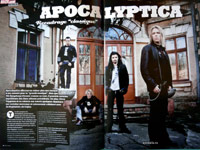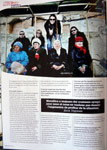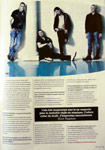"Classic" Refocusing - interview with Apocalyptica
Original french interview by Jean-Pierre Sabouret, "Rock Band" magazine, #1, 2010
English translation - Vordaï Mercier
Apocalyptica makes a return that is very clearly marked by its love for the "classical music". Although 7th Symphony can be listened to as a whole, it possesses certain ingredients of both previous albums. In addition, Eicca Toppinen and his combo invited some singers on certain pieces, and in particular collaborated with Joe Duplantier, of Gojira.
Rock Band: The pompous title of 7th Symphony could let one think that this time you had crossed line and sunk in "dark side of the strength" of the classic, but in fact, it's not the case. Weren't you afraid that those who like the vocal pieces of the previous albums would think that this one is too instrumental?
Eicca Toppinen: When the moment will come, we will certainly make a completely orchestral album. We don't pretend that 7th Symphony is a pure symphony. We simply liked what this title evoked at the same time for those who know Apocalyptica and those who have never heard about us. For the most die-hard fans, the instrumental tracks are much more epic and more orchestral than on both previous albums. For others, it clearly shows that the group is, let's say, "different" from a normal Metal band.
Rock Band: Let's be clear, you didn't mean to make a Beethoven adaptation in a Metal style.
Eicca Toppinen: We had vaguely thought of it but just for fun. Beethoven's 7th Symphony is remarkable and it's probably the most popular. But we especially wanted to let people know that as for the great composer, 7th Symphony is a crucial step for us. If we look back in the past, I believe that this album is to be compared to Cult. Which is a good thing.
Rock Band: In what measure?
Eicca Toppinen: After Cult, when I began to compose songs with vocals, I tried to learn how to make them the most effective possible, completely contrary to the purely instrumental tracks. We had arrived at the point where we had eight or ten songs with vocal and only three or four instrumental tunes. By looking back at the whole, we realized that we had gone too far, that instrumental pieces were really missing. Instead of choosing the easy way and taking some of the compositions written for vocal and keeping only the instrumental lines, I preferred to go back to work, to compose two new plays. They are the ones which make the opening and the conclusion of the album ("At The Gates Of Manala" and "Rage Of Poseidon"). And even after we had quite progressed, I carried on composing "Sacra". We had not recorded the slightest demos and everything could evolve along the way. When I showed "At The Gates Of Manala", the others began to ask me for the number of measure and its structure, and I answered them, "I know nothing about it, but that sounds good that way!". I never count measures or that kind of things, even on stage. Everything is printed in the depths of me.
Rock Band: And to think I thought you were serious and educated musicians even if not very academic... I am terribly disappointed! (Laughs)
Eicca Toppinen: But we are very serious! Though it's important for the music not to play it safe, to try to innovate, to remain creative without knowing too much where you're going to. There is a kind of magic when you play something for the first time. While when you record elaborate demos you obtain things which cannot be exactly reproduced. Nothing replaces spontaneity. To play off key or to make errors is a blessing. A dissonance can open a new perspective. The major problem of the classic musicians is that they are completely terrified at the idea of making the slightest error.
Rock Band: It is true that academic musicians are often blamed for their excessive rigor and their lack of imagination. How did you succeed in, as we could say, "go out of the straight and narrow"?
Eicca Toppinen: It's been a long time I don't respect the slightest rule in music anymore. I even use to say that henceforth I create noise. I like creating noise. I improvise in huge proportion, which is an aberration in classical music. Even on the album, all my wah wah solos are improvised.
Rock Band: How do you proceed when you invite musicians as Dave Lombardo (Slayer)?
Eicca Toppinen: We made everything upside down on "2010". Mikko (Siren, drums) sat in front of Dave, both drum kits watching each other's, thus, and they played on pieces of riff, not on complete tracks. Doing it, they created elements which we combined in a certain way and after that, we composed the cello parts. It was really fascinating to proceed this way. Beside Apocalyptica, Mikko have his fun in making electro music. For this track he brought this kind of influences. We also composed "On The Rooftop With Quasimodo" with quite a lot of his style of ideas. I love the fact that we vary the atmospheres and that we take risks. When bands play it safe by avoiding deviation from their usual style, they begin playing a perfectly boring music. It's necessary to know how to plunge into an environment where you don't feel at ease and to find your marks.
Rock Band: And how was the confrontation with Joe Duplantier?
Eicca Toppinen: We knew Gojira for years, but we never had the opportunity to meet them. It 's Jacques, our common publisher in France, that made the link. Then we spent two days in Paris with Joe, to work in studio. What I like it is that the result is neither typically Gojira nor typically Apocalyptica, it's rather strange... (Note from Vordai: Feels like I heard that before...)
Rock Band: How are your relations with Metallica lately, Do they support you as much as in the beginning?
Eicca Toppinen: We always get along extremely well, even if it's been a while since we met. Last time was when they came to play in Helsinki, a little more than one year ago. Every time, they are very obliging and arrange everything for us.
Rock Band: You should have recorded S&M with them, instead of the San Francisco symphony orchestra...
Eicca Toppinen: No, but two weeks before, they contacted our management as they absolutely wanted us to be there. They offered us the journey and we were in first row. We weren't able to stay the second evening because our tour was starting and it's a pity because it was more relaxed and because there was a chance for us to play something. A journalist who knows them well certified to me that Michael Kamen, the conductor arranger, tried for a long time to convince the band, but unsuccessfully. It's only because having heard our instrumental versions that they thought it could be not too bad... But that's what I was told, I cannot swear. (Note From Vordai: Well, I can! That's exactly what James told me at the Berlin S&M Meet and greet in 99...)
Rock Band: And what about an collaboration one day, if not with the whole band, at least James Hetfield singing a track, is it possible?
Eicca Toppinen: There always will be a possibility, but the group has always been really nice with us and we don't want to give the impression to take advantage of the situation. They know that we exist and if they want to do it one day, they perfectly know where to find us.
Rock Band: Or then a song for Lars... Lars would say yes immediately! (Laughs)
Eicca Toppinen: No, Metallica is gigantic and it's a very careful band, which I completely understand. Otherwise, Rob Halford (Judas Priest) contacted us, but we had almost finished and it was too late. It will be for next album.
© Apocello.ru, 2010


